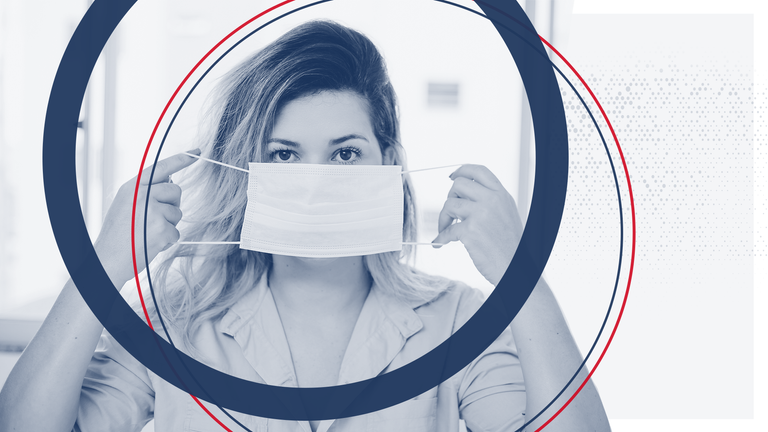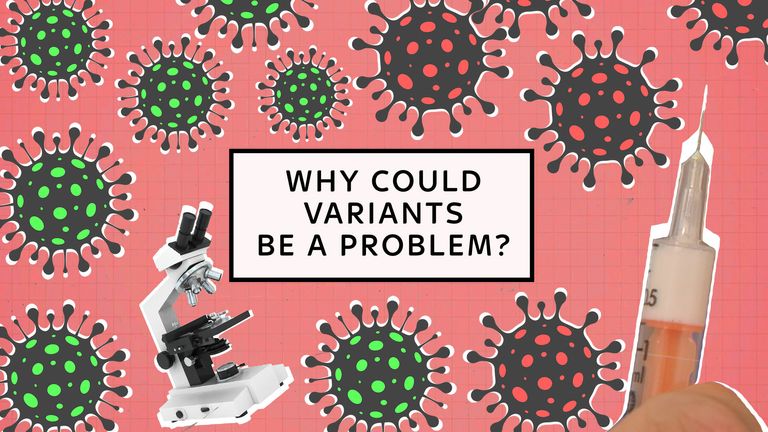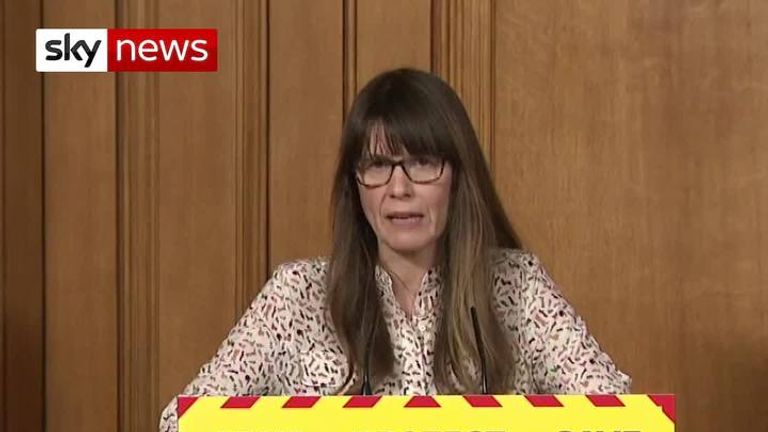South Africa variant: Where in the UK was it found, is it more deadly and do vaccines work?
Sky News answers key questions about the discovery of the variant - and how "surge testing" will try to track every case.
Monday 8 February 2021 09:55, UK
Testing will continue to take place in various parts of the UK to detect "every single case" of the South African variant.
It has already been found in some parts of the country - and everyone in these areas over the age of 16 will be "strongly encouraged" to take a COVID test after cases were found that could not easily be linked to those who had travelled to South Africa.
Here, Sky News answers questions about the South African variant, and how it works.
Live COVID updates from the UK and around the world
What is the new variant?
This variant could be described as similar to the Kent variant plus a bit more - as it has the same mutation as the one found in southeast England, as well as two others.
It is not uncommon for viruses to mutate similarly, and the fact that these two variants have some of the same mutations does not mean they spread from a single point, said Dr Simon Clarke, an associate professor in cellular microbiology at the University of Reading.
In fact, some of these shared mutations are also found in a variant observed in Brazil - again this likely developed separately.
Mutation is something that happens to viruses, and is not unexpected.
And it is thanks to the effectiveness of the UK's genomic research that these mutations have been found.
Dr Alison Barnett, regional director at Public Health England, said: "The UK has one of the best genomic systems in the world which has allowed us to detect the variant originating in South Africa here in Surrey."
Where in the UK are tests being carried out?
So far, the government has said testing for the South Africa variant has been taking place in the following areas:
- London - W7 (Ealing), N17 (Haringey) and CR4 (Mitcham)
- West Midlands - B31 (Birmingham, WS2 (Walsall), WR3 and some people in WR9 (both Worcester)
- East of England - EN10 (Broxbourne)
- South East - ME15 (Maidstone) and GU21 (Woking)
- North West - PR9 (Southport)
These are areas where cases of the virus have been discovered with no link to travel to South Africa.
It is thought it is unlikely people who test positive for COVID-19 will be told if they have the South African variant. Positive coronavirus samples will take longer to analyse to determine what variant is present.
How many people have been infected with the South Africa variant in the UK?
On 8 February, it was revealed that results showed that 147 people have been infected.
Testing in England is aiming to find "every single case" of the mutation after examples were found which appeared to have no links to international travel.
Speaking to Sky News, health minister Edward Argar has insisted the South African variant - also known as 501.V2 or B.1.351 - is not dominant in the UK.
The government said on 2 February it had identified 105 cases of the South Africa variant, 11 of which cannot be traced to travel from South Africa.
Is this variant more dangerous or transmissible?
As the South Africa variant shares the same mutation believed to be responsible for increased transmissibility in the Kent variant, it will follow that it shares traits with it.
This includes being up to 70% more transmissible - and potentially even linked to higher mortality rates.
There are also the other two mutations on the virus.
One of these has been found to have some effect on the efficacy of antibodies stimulated by the vaccines.
Jonathan Ball, professor of molecular virology at the University of Nottingham, said: "We know that some coronavirus variants might be less easily killed by antibodies raised against some of the existing vaccines, but the levels of immunity are hopefully still sufficient to prevent serious disease."
Then there is the case of the third mutation.
Not much is known about how this mutation affects the virus and people who have it.
This is something that will need to be studied and researched in order to understand what happens.
Do the vaccines work?
South Africa has suspended its rollout of the Oxford/AstraZeneca vaccine after data suggested it offered limited protection against mild disease caused by the variant discovered there.
The findings showed the vaccine reduced mild-to-moderate COVID-19 by just 22% in a trial conducted by the University of the Witwatersrand.
Vaccines are still said to work against the South Africa variant - and people are still being urged to get vaccinated - but efficacy is not to the same level as those registered for the previously tested variants.
Dr Hopkins said that three of the trialled vaccines were shown to be effective "at a level greater than what was set as a minimum standard set by the WHO".
There have been indications that this variant could be more resistant to the body's immune response.
This is to do with the spike protein - the bit of the virus that allows it to enter cells, like a key unlocking a door.
A vaccine trains the body to block this key with antibodies, preventing the virus from entering into people's cells.
However, one of the mutations on the South African variant seems to work against these antibodies - and so allows the virus a way back into the cells.
It is important to note that this is not the only way vaccines work - and that there are other ways they prepare the body to battle the virus.
This includes marking the spike proteins to allow the immune system to quickly identify the virus and destroy it.
Dr Hopkins said: "What we do know is that (the variant) has more mutations… that is causing, perhaps, to have diminished effectiveness to a vaccine, but still very good."
Trials carried out by companies behind some of the more recently researched vaccines - such as Novavax and Johnson & Johnson - showed that the jabs were around 20% to 30% less efficacious against the virus in South Africa compared with areas like the UK or US.
However, the vaccinations still reduced the severity of symptoms and helped protect people, and it has been stressed that getting the jabs is still important.






